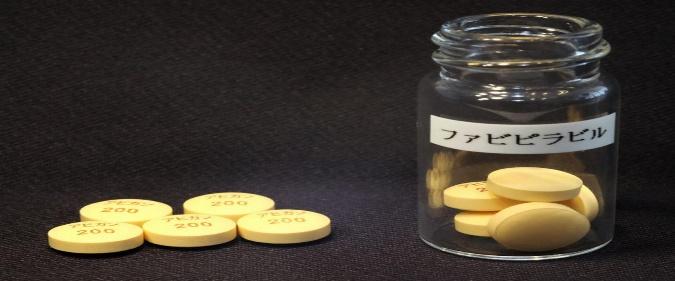KABUL (Pajhwok): Health experts reject an article that claims FavipraVir can cure Covid-19, saying that the medicine has not been proven by the World Health Organization to treat the disease.
FavipraVir was produced in Japan in 2014 for the treatment of influenza.

Some social media pages and media websites recently published topics that claim FavipraVir can treat Covid-19 patients.
Independent Persian website has published an article which titled ‘FavipraVir is a good medicine for treatment for Covid-19’
The article says, “Considering the usage history of FavipraVir in Japan, there is a lot of data about the safety of the drug.”
The articles continues that an expert who tested anti-influenza drugs for treatment of Covid-19 said that such medicines are ‘good choice’ for treatment of people who spend their Covid-19 infection in their homes.
“FavipraVir drug which was licensed in Japan in 2014 for the treatment of influenza, shows that the drug is able to reduce Covid-19’s damage to lung and shorten the disease’s time,” the article says.
Meanwhile, Dr. Mohammad Nasir Jala, in a post on his Facebook page titled (Good news about the medicine for Covid-19) said that FavipraVir which produced in Japan for treatment of flu has also proven effective treatment of Covid-19.
He said that Japan has used the drug for treatment of Covid-19 patients. “Japanese president has said that the drug is good for treatment of Covid-19, he also asked other countries to use it but other countries considered his statements as political and economic issue and they ignored it,” he said.
He said that many countries such as China, India and Russia are testing the medicine and Russia and India found it beneficial while India has ordered one of the country’s companies to produce the medicine and present it to the market.
“When virus enters your body and then targets a cell, it deceives the cell and there is a substance called enzyme which makes a copy of the virus inside the cell, but this medicine stops the copying process of the virus and it prevents the disease from reaching critical stage,” he said.
Jala said that FavipraVir is a 200 milligram tablet which should be taken by a patient in initial time of the disease. The medicine should be used under the instruction of a doctor and people should not use it arbitrary.
He said that the medicine had proven effective for people of ages between 18 to 75 years and should be taken by infected people for a period of two weeks. The patients start recovering within three to five days, he added.
The medicine should not be taken by pregnant and breastfeeding women as well as people that have issues with their immunity and livers.
Dr. Obaidi, an Iranian pharmaceutical scientist in an article on his website said, “The production of Cytovex which is scientifically called Favipiravir has started in Dr. Obaidi’s pharmaceutical plant. This drug was for the first time developed by Toyama Chemical Co., Ltd and it was licensed by Japan Pharmaceuticals and Medical Devices Agency in 2014 as medicine for treatment of influenza. Food and Drug Administration of Iran also this summer listed Favipiravir as official medicine for treatment of influenza.”
“Doctors around the world are prescribing antiviral drugs for the treatment of Covid-19, one of these drugs is Favipiravir. Clinical trials on Covid-19 infected patients in different countries showed that the drug is effective for reducing the replication process of the virus and accelerates healing process of lung lesions as well as it is associated with less side effects,” he said.
Fact-finding
On the other hand, health experts reject the effectiveness of the drug for treatment of Covid-19.
Dr. HashmatulalhFaizi, in charge of ICU in Afghan-Japan Hospital in Kabul said, “At the start of Covid-19 pandemic, we were prescribing this tablets for coronavirus patients; because it is good for the relief and improving the situation of a patient.”
He said that the medicine was good for coronavirus patients during initial stages of the disease but it was ineffective when the disease becomes critical. He said that World Health Organization has not recommended the medicine so far.

Meanwhile, Dr. WahdatAlkozai, head of ShiekhZahid Hospital in Kabul, called Favipiravir an antiviral drug and said that the medicine was used for treatment of influenza in 2014 and it was effective.
“As influenza is like Covid-19, so some countries find it useful for the treatment of coronavirus,” he said.
However, Alkozai said that the medicine was not so far proven effective for treatment of coronavirus by other countries such as US, Britain and WHO.
“Britain conducted a survey of 1,179 people in 2021 to see if the drug had the expected effects, but they found it has two problems, one was that it is not useful when the disease turns severe, but it may be good for mild to moderate disease, the second problem it has that its effects start from seven to 14 days,” he said.
He said that WHO so far used six types of medicines for treatment of coronavirus, but none of them found to give expected results.
NoorulhaqYousufzai, an internal medicine doctor in Kabul, also said that Favipiravir was not a medicine for Covid-19, but it was an antiviral drug.
He added that coronavirus is a type of RNA virus and drugs used for its treatment cannot eliminate the virus entirely, but they can limit its replication and transmission.
The virus is not a living organism that can be destroyed, so the medicine that is prescribed reduces its activity, he added.
Doctoreto, a website also published an article titled ‘What is Favipiravir, its uses and side effects? Like all other medicines, Favipiravir 200 can also have side effects’
The following side effects have been reported in approximately 20 percent of patients who have taken Favipiravir (less than the recommended dose of Covid-19).
The use of Favipiravir 200 mg tablets leads to a dose-dependent increase in blood uric acid. It is also said that the drug should be used with caution during gout disease, because it can increase uric acid.
Cardiac effects include chest pain, effects on the gastrointestinal tract including decreased appetite, diarrhea, nausea and vomiting, and blood effects including decreased neutrophils and liver effects include damage to liver cells and increased liver enzymes.
Tasnim News website also quoted Mustafa Qaneyee, the head of Respiratory Disease Research Network of Iran as saying that Favipiravir and Remdesivir have no effects on Covid-19 patients.
He said that Favipiravir had no effect on coronavirus, and research has showed that Remdesivir had either no effect or was so ineffective that it was not noticeable.
Afghanistan Ministry of Public Health also said that WHO did not approve the medicine so far.
JavidHajir, a spokesman of the ministry, told Pajhwok that during the start of coronavirus pandemic, different types of medicines were recommended for the treatment of the virus around the world.
He said that except medicines which have been approved by WHO, other medicines could not be proved for the treatment of Covid-19. He said that Favipiravir is not proved by WHO to treat coronavirus.
So far, the WHO has recommended the use of two drugs, including baricitinib and sotrovimab, to treat Covid-19.
Baricitinib can reduce the need for ventilation while sotrovimab can reduces the risk of hospitalization.
mds/ma







GET IN TOUCH
NEWSLETTER
SUGGEST A STORY
PAJHWOK MOBILE APP